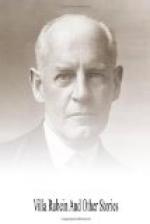“I’m beat, Chris,” he whispered. “Let him know, I want to see him.”
His voice grew a little stronger. “I thought that I could see it through—but here’s the end.” He lifted his hand ever so little, and let it fall again. When told a little later that a telegram had been sent to Harz his eyes expressed satisfaction.
Herr Paul came down in ignorance of the night’s events. He stopped in front of the barometer and tapped it, remarking to Miss Naylor: “The glass has gone downstairs; we shall have cool weather—it will still go well with him!”
When, with her brown face twisted by pity and concern, she told him that it was a question of hours, Herr Paul turned first purple, then pale, and sitting down, trembled violently. “I cannot believe it,” he exclaimed almost angrily. “Yesterday he was so well! I cannot believe it! Poor Nicholas! Yesterday he spoke to me!” Taking Miss Naylor’s hand, he clutched it in his own. “Ah!” he cried, letting it go suddenly, and striking at his forehead, “it is too terrible; only yesterday he spoke to me of sherry. Is there nobody, then, who can do good?”
“There is only God,” replied Miss Naylor softly.
“God?” said Herr Paul in a scared voice.
“We—can—all—pray to Him,” Miss Naylor murmured; little spots of colour came into her cheeks. “I am going to do it now.”
Herr Paul raised her hand and kissed it.
“Are you?” he said; “good! I too.” He passed through his study door, closed it carefully behind him, then for some unknown reason set his back against it. Ugh! Death! It came to all! Some day it would come to him. It might come tomorrow! One must pray!
The day dragged to its end. In the sky clouds had mustered, and, crowding close on one another, clung round the sun, soft, thick, greywhite, like the feathers on a pigeon’s breast. Towards evening faint tremblings were felt at intervals, as from the shock of immensely distant earthquakes.
Nobody went to bed that night, but in the morning the report was the same: “Unconscious—a question of hours.” Once only did he recover consciousness, and then asked for Harz. A telegram had come from him, he was on the way. Towards seven of the evening the long-expected storm broke in a sky like ink. Into the valleys and over the crests of mountains it seemed as though an unseen hand were spilling goblets of pale wine, darting a sword-blade zigzag over trees, roofs, spires, peaks, into the very firmament, which answered every thrust with great bursts of groaning. Just beyond the veranda Greta saw a glowworm shining, as it might be a tiny bead of the fallen lightning. Soon the rain covered everything. Sometimes a jet of light brought the hilltops, towering, dark, and hard, over the house, to disappear again behind the raindrops and shaken leaves. Each breath drawn by the storm was like the clash of a thousand cymbals; and in his room Mr. Treffry lay unconscious of its fury.




